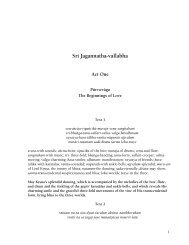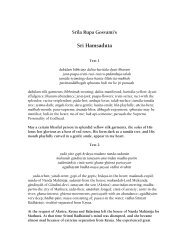Srimad Bhagavatam, Volume 3
Srimad Bhagavatam, Volume 3
Srimad Bhagavatam, Volume 3
Create successful ePaper yourself
Turn your PDF publications into a flip-book with our unique Google optimized e-Paper software.
SEVENTEENTH CHAPTER<br />
Punishment And Reward of Kali<br />
Sri Suta Uvaaha:<br />
Tatra Gomithunam raja hanyamana anathabat<br />
Dandahastam cha vrisalla dadrishe mripa lanchhanam.<br />
Sri Suta uvacha—Sri Suta Goswami said, Tatra—thereupon, Gomithunam—<br />
the pair of cow and bull, Rajo—the king, Hanyamanam—being beaten by,<br />
Anathabat—appearing to be bereft of owner, Dandahastam—with logger in<br />
the hand, Cha—also, Vrisalam—lower caste Sudra, Dadrishe—observed,<br />
Nripa—king, Lahchhanam—dressed like.<br />
Suta Goswami addressed the Rishis headed by Sounaka and said, 'After<br />
reaching the place Maharaj Parikshit observed it that a lower caste<br />
Sudra dressed like a king with loggger in the hand was just beating a pair<br />
of cow and bull, as if they were bereft of the owner.'<br />
Principal signs of the age Kali is that lower caste Sudras i,e.men, without any<br />
brahminical culture and spiritual initiation, would be dressed like the<br />
administrators or kings and the principal business of such non—Kshatriya<br />
rulers will be to kill the innocent animals specially the cows and the bull who<br />
shall be unprotected by their masters namely the bonafide Vaishyas or the<br />
merchantile community. In the Bhagawat Geeta (Bg. 18.44) it is said that the<br />
Vaishyas are meant for dealing in agriculture, cow protection and trade. In the<br />
age of Kali the degraded Vaishyas or the so called merchantile men are more<br />
engaged as supplying agent to the slaughter-houses than protecting the cow<br />
and the bull. The Kshatriyas are meant for protecting the human being citizens<br />
of the state while the Vaishyas are meant for protcting the cows and the bulls<br />
and utilise them in the matter of producing grains and milk. The cow is meant<br />
for delivering milk and the bull is meant for producing grains. * But in the age<br />
of Kali the Sudra-class men will be on the post of administrators and the cows<br />
and the bulls or the mother and the father without being protected by the<br />
Vaishyas will be subjected to be beaten in the slaughter-housc organised by<br />
the lower caste administrators.<br />
Vrisam mrinalbhaval am mehantam iva vibhyatam<br />
Vepamanam padaikena seedantam sudrataditam.<br />
Vrisam—the bull, Mrinaladhavalam—as white as the white lotus,<br />
Mehantam—urinning, Iva—as if, Vibhytam—being too much afraid of,<br />
Vepamanam—trembling, Padaikena—standing on one leg only, Seedantam—<br />
terrified by, Sudrataditam—being beaten by a Sudra.<br />
The bull was as white as the white Lotus flower and was terrified of being<br />
beaten by the Sudra; it was too much afraid of him and thus trembling<br />
and standing on one leg was urining.<br />
The next symptom of the age of Kali is that principles of religions which are<br />
all spotless white like the white lotus flower, will be attacked by the<br />
uncultured Sudra population of the age. Such attacking people may be<br />
descendants of Brahmin or Kshatriya forefathers but in the age of Kali for<br />
want of sufficient education and culture of Vedic wisdom, such Sudra like<br />
population will defy the principles of religion and persons who are religiously<br />
endowed will be terrified by such Sudra class of men. They will declare<br />
themselves belonging to no religious principles and many 'isms' and 'cult' will<br />
spring up in the Kali Yuga only for killing the spotless bull of religiosity. The<br />
state will be declared as secular or without any particular principle of religion<br />
and as a result of this there will be total indifference to the principles of<br />
religion, the citizens will be free to act as they like without any respect for<br />
Sadhu, Sastra and Guru. The bull was standing on one leg means that the<br />
principles of religiousity are gradually being diminished or practically without<br />
any standing and even that fragmental existence of religious principles would<br />
be embarrased by so many obstacles as if in the trembling condition of falling<br />
down at any time.<br />
Gam cha dharmadugham deenam bhrisam sudra padahatam<br />
Vivatsam asruvadaham kshamam yava samichhatim<br />
Gam—the cow, Cha—also, Dharmadugham—as beneficial as one can draw<br />
religiosity from her, Deenam—now rendered poor, Bhrisam—distressed,<br />
Sudra—the lower caste, Padahatam—beaten by the leg of, Vivatsam—<br />
without any calf, Asruvadanam—with tears in the eyes, Kshamam—very<br />
weak, Yava—grass, Samichatim—as if desiring to have same grasses to eat.<br />
The cow is also as beneficial as one could draw out religious principles<br />
from her, but she is now rendered poor, without any calf and being<br />
beaten by the leg of a Sudra, she is too much distressed with tears in her<br />
eyes and being too weak she is hankering after some grass on the field.<br />
The next symptom of the age of Kali is the distressed condition of the cow.<br />
Milking the cow means drawing the principles of religiosity in liquid form.<br />
The milk means cow's milk because it is liquid form of religious principles.<br />
The great Rishis and Munis would live only on the subsistence of milk. Srila<br />
Sukadeva Goswami would go to a householder while milking the cow and he<br />
* So the cow is the mother and the bull is the father of human being. The<br />
father and mother must be given all protection and not to be killed.<br />
45<br />
would simply take a little quantity of it for subsistence. Even fifty years<br />
before no body would deprive a Sadhu for a pound or two of milk and every<br />
householder would spare milk like water. For a Sanatanist (the follower of<br />
Vedic principles) it is duty of every householder to have cows and bulls as<br />
household paraphernalia not only for drinking milk but also for deriving<br />
religious principles from her. The Sanatanist worships cow on religious<br />
principles as much as a Brahmin is so respected. The cows milk is required<br />
for the purpose of sacrificial fire and by performing sacrifices the householder<br />
can only be happy. The cow with her calf is not only beautiful to look at but<br />
also it gives satisfactlon to the cow and happily she delivers milk as much as<br />
possible. But in the Kali Yuga the calves are separated from the cow as early<br />
as possible for purposes which may not be mentioned in these pages of<br />
<strong>Srimad</strong> Bhagwatam. The cow stands with tears in the eyes and the Sudra<br />
milkman draws artificially milk from the cow and when there is no milk the<br />
cow is sent for being slaughtered. These great sinful acts, of the human being,<br />
are responsible for all the troubles in the present society. They do not know<br />
what they are doing in the name of advancement of economic development.<br />
The influence of Kali will keep them in darkness of ignorance and inspite of<br />
all endeavours for peace and prosperity of the human society at large, they<br />
must try to see the cows and the bulls happy in all respects. Foolish people do<br />
not know how happiness is earned by making the cows and bulls happy but it<br />
is a fact by the law of nature. Let us take it from the authority of '<strong>Srimad</strong><br />
Bhagwatam' and adopt the principles for all round happiness of the humankind.<br />
Prapachha ratham adhudhah kartaswara parichhadam<br />
Megha gambhiraya vacha samaropita karmukah.<br />
Prapachha—enquired, Ratham—chariot, Adhudha—seated on, Kartaswara—<br />
gold, Parichhadam—embossed with, Megha—cloud, Gambhiraya—<br />
exonerating, Vacha—sound, Samaropita—well equipped, Karmukah—arrows<br />
and bow.<br />
Maharaj Parikshit seated on the gold embossed chariot and well<br />
equipped with arrows and bow asked him in an exonerating sound of<br />
cloud.<br />
An administrative head or king like Maharaj Parikshit with full gravity of<br />
majestic authority and well equipped with weapons to chastise the miscreant,<br />
can challenge the agents of the age of Kali and then only it will be possible to<br />
counteract the reaction of the degraded age. And in the absence of such strong<br />
executive head there is always disruption of transquility in the general status<br />
of the human society. The elected show-bottle executive head, as<br />
representative of degraded public, can not be equal with a strong king like<br />
Maharaja Parikshit. The dress or style of royal order does not count but it is<br />
the action which is counted.<br />
Kas tam mat sharane loke valat hansi avalan vali<br />
Naradeva asi vesena natavat karmana adwijah.<br />
Kas—who are, Tam—you, Mat—my, Sharane—under protection, Loke—in<br />
this world, Valat—by force, Hansi—killing, Avalan—those who are helpless,<br />
Vali—although full of strength, Naradeva—Manly god, Asi-appear to be,<br />
Vesena—by the dress, Natavat—like a theatrical player, Karmana—by deeds,<br />
Adwijah—a man not born twice by culture.<br />
Oh who are you ? You appear to be strong enough and still you dare to<br />
kill, within my protection, those who are helpless ? By dress you pose to<br />
be a manly god (King) but by your deeds you are against the principles of<br />
the twice born Kshatriya.<br />
The Brahmins, Kshatriyas and Vaishyas are called twice-born because for<br />
these higher class of men there is one birth by parental conjugation and there<br />
is another birth of cultural rejuvination by spiritual initiation from the<br />
bonafide Acharya or spiritual master. So Kshatirya is also a twice-born like<br />
the Brahmin and his duty is to give protection to the helpless. The Kahatrya<br />
king is considered to be the manly-God or representative of God for giving<br />
protection to the helpless and chastising the miscreants. When ever there is<br />
anomalies in this routine work by the administrators there is incarnation of the<br />
Lord for re-establishing the principles of Godly kingdom. In the age of Kali<br />
the poor helpless animals specially the cow which is meant for receiving all<br />
sorts of protection by the administrative heads, are killed without any<br />
restriction. As such the administrative heads under whose nose such things<br />
happen, are so called representatives of God. Such powerful administrators<br />
are rulers of the poor citizens by dress or office only, but factually they are<br />
worthless lower class of men without any cultural assets of the twice-born. No<br />
body can expect any justice or equality of treatment from such once-born<br />
(without any spiritual culture) lower class of men and therefore in the age of<br />
Kali every one is unhappy on account maladministration of the state. The<br />
modern human society are not twice-born by spiritual culture. Therefore the<br />
people's Government, by the people who are not twice-born,—must be<br />
government of Kali in which everyone is unhappy.<br />
Yas tam krishne gate duram saha gandiva dhanwana<br />
Sochya asi asochyan rahasi praharan badham arhasi.












